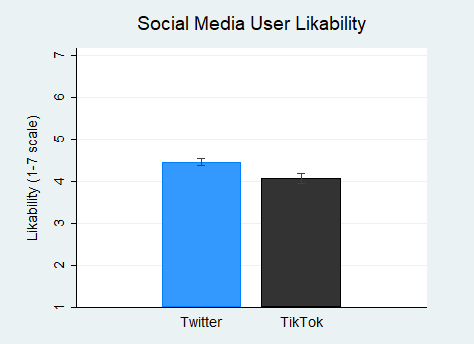Overview
Over half of the world’s population uses social media. But the concept of “social media” is quite fragmented. Different platforms have arisen catering to different demographics with preferences for different mediums. For example, a platform like Twitter specializes in written posts and caters to a broad swath of age groups, particularly Millennials, whereas a platform like TikTok specializes in short videos and caters more to Gen Z.
TikTok is a particularly interesting platform. As a younger platform at the time of this writing, it’s short video-based content differs quite a bit from the more text- and image-based content of Twitter, Facebook, Instagram, and Reddit. It’s content also skews toward a younger generation, with comedy, dancing, and lip-syncing the most popular types of videos uploaded.
With such glaring differences between platforms, it makes us wonder what people think about certain platforms and their users. For example, older critics may question TikTok users’ interest in funny videos and raise eyebrows at its ownership by a Chinese firm. However, younger users may question Twitter users’ desire to post one’s thoughts and life details on a very public platform. Interestingly, despite some of the negative press against TikTok, the platform boasts over 1 billion monthly active users compared to Twitter's 330 million.
So as a fun experiment, we tested what people think of users of TikTok vs. Twitter.
The Experiment
We conducted an experiment with 400 people on Amazon Mechanical Turk in which participants read a hypothetical scenario about a social media user whose favorite platform is either Twitter or TikTok (randomly assigned). Participants then rated how much they like the person.
Participants were instructed to “Imagine that you and a new acquaintance are talking about social media, and they mention that their favorite social media platform is [Twitter / TikTok].”
Participants were then asked “How much do you like this person? (1 = Not at all, 7 = Extremely)” using a 1-7 scale.
Results
The results are in, and it looks like social media platform use does affect user likability. Likability ratings were higher for our hypothetical Twitter user (avg. = 4.47) than our TikTok user (avg. = 4.07), (p = 0.008). However, this was a small difference by statistical standards. The difference was only a quarter of a standard deviation. And notably, neither user’s average rating was below average, though our TikTok user rode that line a bit more closely.
Over half of the world’s population uses social media. But the concept of “social media” is quite fragmented. Different platforms have arisen catering to different demographics with preferences for different mediums. For example, a platform like Twitter specializes in written posts and caters to a broad swath of age groups, particularly Millennials, whereas a platform like TikTok specializes in short videos and caters more to Gen Z.
TikTok is a particularly interesting platform. As a younger platform at the time of this writing, it’s short video-based content differs quite a bit from the more text- and image-based content of Twitter, Facebook, Instagram, and Reddit. It’s content also skews toward a younger generation, with comedy, dancing, and lip-syncing the most popular types of videos uploaded.
With such glaring differences between platforms, it makes us wonder what people think about certain platforms and their users. For example, older critics may question TikTok users’ interest in funny videos and raise eyebrows at its ownership by a Chinese firm. However, younger users may question Twitter users’ desire to post one’s thoughts and life details on a very public platform. Interestingly, despite some of the negative press against TikTok, the platform boasts over 1 billion monthly active users compared to Twitter's 330 million.
So as a fun experiment, we tested what people think of users of TikTok vs. Twitter.
The Experiment
We conducted an experiment with 400 people on Amazon Mechanical Turk in which participants read a hypothetical scenario about a social media user whose favorite platform is either Twitter or TikTok (randomly assigned). Participants then rated how much they like the person.
Participants were instructed to “Imagine that you and a new acquaintance are talking about social media, and they mention that their favorite social media platform is [Twitter / TikTok].”
Participants were then asked “How much do you like this person? (1 = Not at all, 7 = Extremely)” using a 1-7 scale.
Results
The results are in, and it looks like social media platform use does affect user likability. Likability ratings were higher for our hypothetical Twitter user (avg. = 4.47) than our TikTok user (avg. = 4.07), (p = 0.008). However, this was a small difference by statistical standards. The difference was only a quarter of a standard deviation. And notably, neither user’s average rating was below average, though our TikTok user rode that line a bit more closely.
Conclusion
In this case, it does look like everyday people hold a slight bias against users of TikTok despite its size and growing popularity. Perhaps this is the result of negative PR against the TikTok platform and U.S. tensions with its parent company, ByteDance. It’d be interesting to see what these results would look like again in 5 years, assuming both platforms are still around.
Methods Note
We used an independent samples t-test to test for significant differences in perceptions between our two experimental conditions. For significant differences, the difference between the two groups' averages would be large and its corresponding “p-value” would be small. If the p-value is less than 0.05, we consider the difference statistically significant, meaning we'd likely find a similar effect if we ran the study again with this population. To test for significant interactions between the main results and participant demographics, we used OLS regression analyses with interaction terms.
Methods Note
We used an independent samples t-test to test for significant differences in perceptions between our two experimental conditions. For significant differences, the difference between the two groups' averages would be large and its corresponding “p-value” would be small. If the p-value is less than 0.05, we consider the difference statistically significant, meaning we'd likely find a similar effect if we ran the study again with this population. To test for significant interactions between the main results and participant demographics, we used OLS regression analyses with interaction terms.
Popular Experiments
COVID MasksDoes wearing a COVID mask affect how others think of you?
|
Video GamesAre video games more enjoyable than board games?
Does age or gender matter? |
Zero-Sum PoliticsDo Democrats or Republicans view society as win-lose?
|




